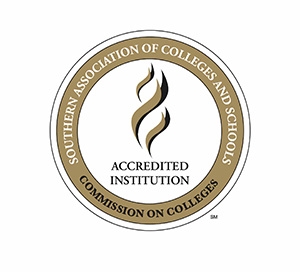The Office of Institutional Research (OIR) is often asked questions about accreditation, program review and outcomes assessment. A few of these questions follow, along with websites for further reading. If you have a question that you don’t see posted here, please email us at ir@ut.edu.
What is accreditation?
The University of Tampa is accredited by the Southern Association of Colleges and Schools Commission on Colleges (SACSCOC) to award baccalaureate, masters and doctorate degrees. Degree-granting institutions also may offer credentials such as certificates and diplomas at approved degree levels. Questions about the accreditation of The University of Tampa may be directed in writing to the Southern Association of Colleges and Schools Commission on Colleges at 1866 Southern Lane, Decatur, GA 30033-4097, by calling (404) 679-4500 or by using information available on SACSCOC’s website (www.sacscoc.org). According to SACSCOC, accreditation is: “intended to assure constituents and the public of the quality and integrity of higher education institutions and programs, and to help those institutions and programs improve. These outcomes are achieved through rigorous internal and external review processes during which the institution is evaluated against a common set of standards. […] Accreditation is a statement of the institution’s continuing commitment to integrity and its capacity to provide effective programs and services based on agreed-upon accreditation standards.”
How have SACSCOC requirements changed in recent years?
The SACSCOC system of reaffirmation is scheduled on a 10-year cycle. The University’s last reaffirmation was in 2015, and the next is scheduled for 2025. Reaffirmation reports call for clear and convincing evidence of effective student learning and a confirmation of assessment activities across all areas of the University, including co-curricular and administrative areas. In addition to this decennial review, the University files annual reports to the Commission.
SACSCOC now requires a fifth-year report that responds to several comprehensive standards. UT will submit its next fifth-year report in March 2031.
Additionally, SACSCOC now requires institutions to post their Substantive Change policy on their public website. Read the University's policy on Substantive Change.
Is assessment and evaluation new to UT?
No, UT has had a long history of engaging in continuous improvement practices. The University has been accredited by SACSCOC since 1951, and since that time has earned several specialized, discipline-specific accreditations. The University treats assessment and evaluation as a part of good professional practice that in turn improves educational and co-curricular programs and services.
Because of its commitment to self-examination and improvement, UT has established an Office of Institutional Research (OIR). The OIR provides management information and analytical support to UT’s decision makers to aid in strategic planning, internal decision making and external accountability. Through collaborative leadership and guidance, the Office provides a broad range of planning, research and assessment activities, including those that support student learning outcomes assessment, department/program review, and institutional and specialized accreditation. In 2008-2009, each College appointed an Outcomes Assessment Coordinator to focus and coordinate assessment and evaluation efforts at the educational program level.
Does the University really use the results of assessment and evaluation?
Yes, the University uses the assessment and evaluation information! Assessment and evaluation information is invaluable to the University as it informs strategic planning and decision-making. It also is used to inform our constituents of our progress as well as our accrediting bodies.
Do I have to use the results of assessment for the purpose of improvement?
Results of assessment should inform planning and decision-making and typically are a part of the improvement process. If assessment results are not useful to a respective program and its improvement strategies, then this should prompt a review of the assessment criteria.
Is it enough for a program or department to have one good measure of student learning?
While having one good measure of student learning is a great first step, the overall assessment of a program or department should include multiple measures. This adjusts for the chance that one of the measures is flawed in some way and gives a better glimpse of the big picture. Examples might include scores from the major field tests, evaluations of classroom projects and classroom test scores. However, one measure can be used to assess several objectives.
Do administrative and educational support units need to establish outcomes?
Yes, it is a good professional practice that all departments and units identify expected outcomes. This may be done at either the divisional or the departmental level, as long as areas are able to show evidence that assessment and evaluation are part of their regular, professional practice.
Doesn't assessment infringe on academic freedom?
Assessment and evaluation are part of professional practice, and regional accrediting bodies such as SACSCOC have developed review systems that are peer-driven. Both academic freedom and assessment practices can be preserved when faculty collaborate with their peers. In this environment, learning outcomes and other evaluative information are broad-based representations of disciplinary core values that a group of faculty peers develops and measures together.
The University of Tampa is accredited by the Southern Association of Colleges and Schools Commission on Colleges (SACSCOC) to award baccalaureate, masters and doctorate degrees.

